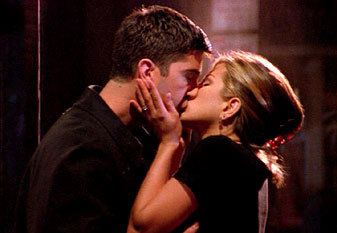
If I had a dollar for every time I watched this kiss, I’d probably only have $50. That was a lot when I was 12.
You’ve seen it all before: A couple TV audiences have been rooting for is finally going to hook up. They’ve somehow ended up locked in a place with no way out, or in a really intense argument because the tension between them has been growing, and the inevitable is about to go down.
The audience feels the crescendo as someone inevitably leans in to snag that first much-anticipated kiss. It takes a turn for the passionate, but as things get more heated, the camera pans away from the action and blurs as it settles on some romantic light source in the room like the reflection of raindrops on a nearby window. Everything else is left to the viewers’ imagination. What happens after that passionate kiss, we assume, is that the characters took their clothes off and engaged in the commonly accepted form of a sex act: good old fashioned penis-in-vagina sex.
Unfortunately, TV has sex all wrong. It teaches us that there isn’t much to sex — other than passionate kissing and missionary. Television shouldn’t have to act as a replacement for sex education, but Googling #WaronWomen will show you just how much of a priority quality sex education has become in the US. So why shouldn’t TV be the thing that tries to present the realities of certain subjects?
Let’s take a look at Glee. Now, I know this season has been terrible, you guys. But let’s not forget the times Glee was honest with us about our lives. Those were the good ol’ days, weren’t they? Remember the one where all those crazy kids lost their virginities…twice? My favorite thing about the two episodes of Glee where people were losing their virginity is that virginity is presented in all ways.
We see Kurt and Rachel, the romantics, taking their virginity very seriously. After having a frank discussion with his dad about the ins-and-outs of sex and the emotions associated, Kurt chooses to lose it to his long-term boyfriend. Finn and Santana, on the other hand, are coming from a side of curiosity. Sex is shown as something that can be simultaneously meaningful to one group of people and less meaningful to another group of people. It suggests that losing your virginity is something that is a personal choice, and every individual should be able to process the act however they please.
The most unfortunate thing about this content is that when parents saw teenagers having sex on TV, they used it as an opportunity to kick and scream at the network and the advertisers instead of sitting down and having the frank discussions about sex. Instead of changing the channel to protect children that may be too young for such content, they protested advertisers and prevented everyone in the family from watching such filth. The more unfortunate thing is that this happens all the time. It’s been happening for a long time.
It all began with Lucy and Ricky. They slept in separate beds and weren’t allowed to use the phrase “pregnant” to describe Lucille Ball’s real life pregnancy with *gasp* her husband, Desi Arnez. Although it was being used in the plot, likely to avoid covering up the belly, it was still not something that could be talked about with such crude language as the word “pregnant.” The producers used more politically correct terms like “with child” or “expecting” instead.
America has finally come to terms with married couples sharing beds and pregnancy, but there are certainly some subjects that are still highly controversial on network television. Funny that none of these subjects are senseless acts of violence or acts of hate, but rather, the acts of love between two people. On shows like Law & Order: Special Victims Unit, the detectives discuss the explicit details of violent sex acts. Why can’t characters on other shows discuss healthy sex acts with equal detail and candor?
The problem isn’t the amount of sex on TV, but that sex is portrayed dishonestly to viewers. This is not about more or less censorship and saying certain subjects shouldn’t be talked about on TV. It’s about the lack of sex education we already have being supplemented with more bad information.


